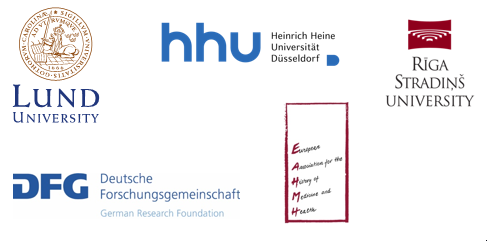Medicine in the Baltic Sea Region since the early 20th Century: Networks, transfers, consequences
Bridging the Baltic Symposium III
When and where: March 18-19, 2021, Zoom
A new “Hanseatic League”, “a global hotspot for health”, “one of the most innovative science macro-regions in the world”? In the fields of life science and technology, politicians and managers of current large research projects describe the Baltic Sea region as a hub of cutting-edge research. How did these images emerge? Although several research programs have been established to foster research on this territory, surprisingly few publications deal thoroughly with “Baltic Sea networks” in medicine and health sciences and their impact for the production and spread of knowledge.
This symposium, organised by the Heinrich-Heine-University, Lund University and the Riga Stradins University, brings together researchers who currently work on aspects of history of medicine in the Baltic Sea region to illuminate currents of ideas and areas of cooperation and conflict. The focus is on scientific networks and transfers since the turn of the 20th century with a prime focus on the Cold War. The symposium is supported by the German Research Foundation (DFG) and the European Association for the History of Medicine and Health (EAHMH).
Given the Covid-19-situation, the presentations will take place via Zoom. The talks shall not exceed 15 minutes, followed by 5 minutes discussion.
CONTACT & REGISTRATION
Dr Nils Hansson
Department for the History, Theory and Ethics of Medicine
Heinrich-Heine-University Düsseldorf, Moorenstr. 5, 40225 Düsseldorf, Germany
E-mail: nils.hansson@hhu.de
Phone: +49 211 81 06437
PROGRAMME
Medicine in the Baltic Sea region: Networks, Transfers, Consequences
Thursday March 18, 2021
10.00 Welcome from the organizers
10:10-11:40. Session I
Networks and impact (Chair: Peter M Nilsson, Lund)
Ulrika Lagerlöf Nilsson, Gothenburg:
Construction of excellence in “Baltic” medicine: Elite as a theoretical concept
Friedrich Moll, Thorsten Halling, Nils Hansson, Düsseldorf:
The Alwall/Gambro connection: Nephrologist Franz Volhard’s contacts in Scandinavia
10:50-11:10 Break
Martin Göllnitz, Marburg:
Struggle for interpretations? National Socialist science policy in the Baltic Sea region with special emphasis on medicine
Heiner Fangerau, Düsseldorf: Commentary
11:40-13:00 Lunch
13:00-14:10. Session II
Transfers: Objects and images (Chair: Juris Salaks, Riga)
Yvonne Gavallér, Düsseldorf:
Changing objects. Scientific transfer between Germany and Sweden on the example of neurasthenia
Kristin Halverson, Stockholm:
Tools of the Trade: Medical Devices and Historical Meanings in Sweden and Denmark 1850-1900
Felicitas Söhner, Düsseldorf:
An iconic image of the 20th century: Lore Zech and the chromosome banding technique at the Karolinska Institute
Anna Tunlid, Lund: Commentary
14:10-14:20 Break
14:20 - 16:00. Session III
Contacts during the Cold War (Chair: Jonatan Wistrand, Lund)
Anne Oommen-Halbach, Düsseldorf:
Korczak studies in East and West since the 1970s – German-Polish research on the Polish paediatrician and pedagogue Janusz Korczak (1878-1942)
Alexandra Nicolaidis, Peter M Nilsson, Lund:
Medicine and ideology: The Swedish physician Andrea Andreen and the Stalin Peace Prize 1953
15:00-15:10 Break
Juris Salaks, Kaspars Antonovičs, Riga:
Scientific travels and reports: from Latvian SSR to GDR/FRG and the Scandinavian countries, 1980-1990.
Nils Hansson, Düsseldorf:
Travel reports by natural scientists and physicians, German Democratic Republic/Sweden 1960-1990
Sven Widmalm, Uppsala: Commentary
Friday March 19, 2021
10:00-11:00. Session IV
Cut and Paste? Exchange between surgeons in the Baltic Sea region (Chair: Ieva Lībiete, Riga)
Andreas D. Ebert, Berlin:
Gynecology and Obstetrics in the Baltic Sea region: The importance of Albertus University Königsberg 1844-1945
Bengt Uvelius, Lund, Friedrich Moll, Düsseldorf/Köln:
Skills in laparoscopy: The Baltic network of Hans Christian Jacobaeus
Ulrike Eisenberg, Berlin:
Contacts among neurosurgeons in northern Europe during the Cold War with focus on H. Olivecrona
11:00-11:20 Break
11:20-12:00 Discussion in break-out-rooms
12:00-13:00 Lunch
13:00-14:50. Session V
Outlook & Commentary (Chair: Nils Hansson, Düsseldorf)
Frederike Felcht, Frankfurt:
Poverty, Hygiene and Sexuality in Scandinavian Working-Class Literature
Joanna Nieznanowska, Szczecin:
From Scratch: the Foundation and the Beginnings of the Pomeranian Medical University of Szczecin
Steffen Fleßa, Greifswald:
Innovations in Healthcare of Peripheral Regions – Greifswald as Incubator for the Baltic Sea Region?
14:00-14:10 Break
Jennie Junghans, Florence:
Between trauma and treatment: tracing international relations in the development of child psychiatry in Denmark, c. 1900-1960
William Studdert, Hamburg:
Taming the European Leviathan: The Legacy of Post-War Medicine and the Common Good
Peter M Nilsson, Lund:
Insulin´s 100 years Anniversary – How was it implemented in the Baltic Sea area?
15:00-15:10 Break
15:10-16:00. Session VI
On the horizon (Chair: Yvonne Gavallér, Düsseldorf)
Yvonne Gavallér, Felicitas Söhner, Nils Hansson, Düsseldorf:
Bridging the Baltic – A student poster project
Thomas Wegener Friis, Odense:
Project ideas
Nils Hansson, Düsseldorf:
Publication plans and information about the next network meetings in Riga (August 20-21, 2021), and in Düsseldorf (2022)
Discussion and Farewell
Scientific Board
Denmark: Thomas Wegener Friis (Odense); Estonia: Erki Tammiksaar (Tartu); Finland: Pieter Dhondt (UEF, Joensuu), Heini Hakosalo (Oulu); Germany: Ulrike Eisenberg (Berlin), Fritz Dross (Erlangen), Thorsten Halling (Düsseldorf); Latvia: Ieva Lībiete, Juris Salaks (Riga); Lithuania: Aistis Žalnora (Vilnius); Poland: Władysław Bułhak (Warsaw), Joanna Nieznanowska (Szczecin); Sweden: David Dunér, Alexandra Nicolaidis, Bengt Uvelius (Lund).



